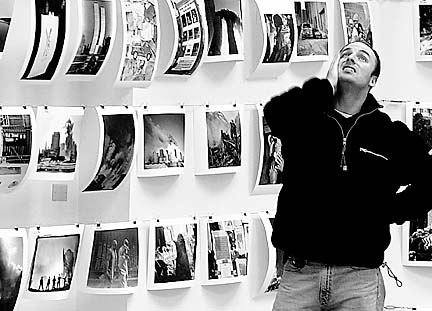


|
Too scared The memory of the hijacked planes exploding into the World Trade Center towers on Sept. 11 will be forever burned -- as perfectly as a photo -- on our minds. Or will it?
to remember
A UH-Hilo study suggests that
distance from Sept. 11, measured by
both time and geography, can blur
facts regardless of how
unforgettable they seemBy Lisa Asato
lasato@starbulletin.comPreliminary findings of a Sept. 11 memory study including 125 college students at the University of Hawaii-Hilo is further proof that even the most traumatic events are not remembered as accurately as some might expect, says Kathy Pezdek, the principal investigator.
"Very often, there's a relationship between how you experienced something and how you remember it," she said.

|
Pezdek, a psychology professor at Claremont Graduate University, surveyed nearly 700 college students in New York, Hawaii and California seven weeks after the attacks.She said New York students spent more time reading up on the terror strikes in the week following the attacks, and they remember the events more accurately than their California and Hawaii counterparts. "The groups that are more affected by the event are going to pursue more information about it and therefore remember it more accurately," she said.
While New Yorkers reported their initial reactions to the attacks were disbelief, Hilo students reported a sense of detachment, Pezdek said. Asked to describe in detail their initial reactions, New Yorkers, who "experienced the event as an isolated sequence of shocking events that they only understood later," typically responded: "I can't believe this is happening," "I kept thinking I was watching a movie" or "This isn't real."
Typical responses from students in Hilo, on the other hand, reflected "that they didn't think that this related to them, and fewer Hawaiians reported this disbelief that I'm talking about. For them it was kind of a matter-of-fact event."
She said she chose Hawaii because of the six-hour time difference with New York. Those in Hawaii and California, she said, had the luxury of getting the news presented to them in a form that made sense, after a time line and terrorism link had been established.
An interesting characteristic from the Hawaii sample, she said, was that people compared the terrorist attacks to the attack on Pearl Harbor. "Hawaiian people were trying to make sense of this is in a way that made sense to them," she said. "It shows again, people don't remember exactly what happened, but they remember an event in terms of how they experience it."
Liz Phelps of New York University is also conducting a study with memory researchers from Stanford and Harvard universities, among others.
She said all the things Pezdek has found "make sense."
"Some evidence suggests how emotionally involved you were, how strong your emotional response was to the attack. That would suggest they would have more accurate memories later on," Phelps said.
She said: "Memory is our lasting representation of the world.
"When we look back on our lives, really all we have are our memories. This event in particular is going to have an impact not just on us personally, but on our country and the world. And how we remember it is going to be related to not only who we are, but how we interpret it and how we react in the future."
Pezdek said she plans to follow up on her study in a year, and perhaps three and five years down the line.
Over time, she said, people will start to compress or "telescope" an event, meaning they remember it in a much shorter time span that it actually was.
That was true when she asked people how much time passed between the time the first tower was struck and when it collapsed, she said. All groups answered about one hour. It actually took 1 hour and 48 minutes.
"People experienced this thing in compressed time, so that's how they remembered it," she said. "It felt like it happened very fast, but actually it was 108 minutes."
The importance of her study, she said, is that it refutes statements commonly given by eyewitnesses in court who say, "I'll never forget that face; that face is burned on my brain."
The study, she said, is further proof that there is none of that kind of picture-perfect recollection, or "flashbulb memory."
"If there is, people would remember this event much more accurately than they did," she said. "Even New Yorkers are showing distortions in their memory."